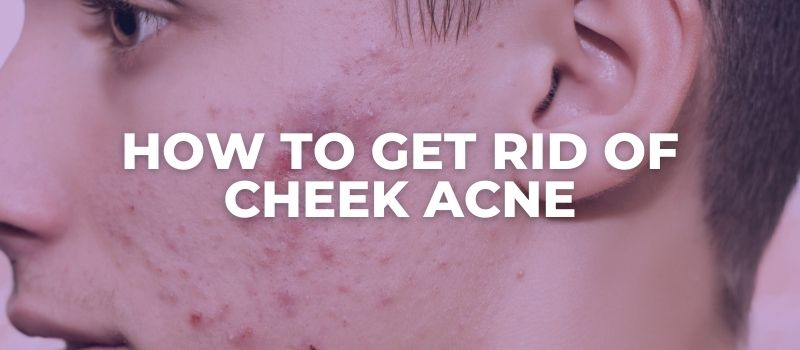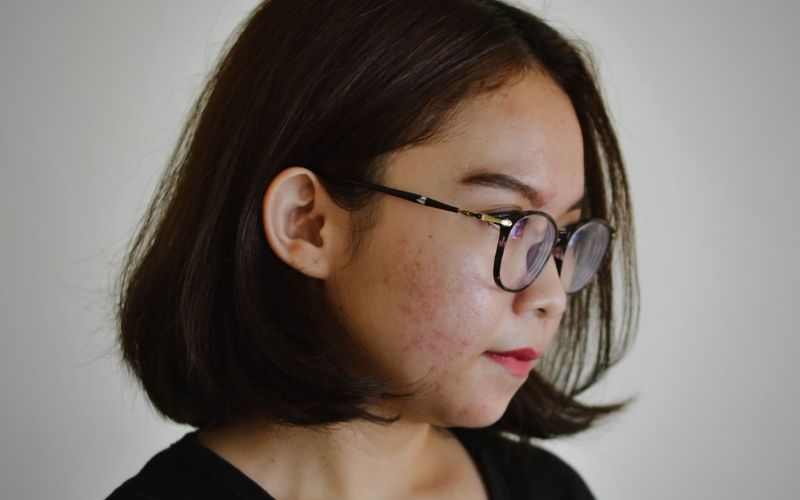Having acne on the cheeks is the most common place for acne (right after on the forehead) however, it is no different than acne on any other part of the face, neck, chest, back, and even bum.
Acne is a common occurrence that can manifest itself on any area of the body and it usually appears in the form of solid red or purple bumps that often have a collection of pus at the top.
There are many ways you can get rid of cheek acne, however, the most important thing to do is to pay attention to good skincare practices, especially your cleansing and exfoliating habits.
In this article, we will discuss everything you need to know about what causes acne on the cheeks and most importantly, how to get rid of cheek acne.

What Causes Acne On The Cheeks?
As I already mentioned before, acne on the cheeks is no different from acne on other parts of the face and body, so the main cause of cheek acne is clogged pores.
Our pores are an opening to a hair follicle and underneath the surface of the skin, attached to the follicle are sebaceous glands which are tiny sebum-producing glands we have all over the body except on several areas such as the palms of the hands, soles of the feet, and lips.
If not adequately removed, the pore can easily become clogged with excess sebum and dead skin cells. When the pore becomes clogged, this creates a perfect, airless environment for bacteria to thrive and cause inflammation and acne. But besides that…
There are a few common things that can trigger excess oil production and lead to clogged pores such as:
Let’s mention a few of these and explain how they could possibly affect you.
Hormonal changes
Hormones can often be blamed for triggering acne breakouts on any area of the face and body. This is almost always the case when it comes to puberty, pregnancy, and occasional pimples you get during your period.
Additionally, hormones released during stressful situations can also stimulate the sebaceous glands to produce more oil, leading to more clogging and acne breakouts.
And while this may sound like something you cannot control, you can try to lessen the negative effects by avoiding stressful situations and having an excellent skincare routine to support your skin.
Using bad skincare products
I always stress this particular issue and I can even say that this is why I started my blog in the first place – to help people make good choices when purchasing skincare products.
Skincare products often contain questionable ingredients that can have all sorts of negative effects on your skin.
These can worsen those pesky little bumps on your cheeks and even contribute to acne starting to appear in other areas, too.
Some of these ingredients may be too heavy and pore-clogging.
At the same time, others may be too drying and dehydrating for the skin and can even harm the skin’s moisture-holding capacity, forcing the sebaceous glands to produce more oil to compensate for the lack of hydration.
Some of these are drying alcohols such as Alcohol denat as well as fragrance and other fragrant components that can awfully irritate and dehydrate the skin in the long run.
Additionally, acne is also very common in men that have a beard and tend to use heavier balms, creams, and oils to style it.
These ingredients can easily get in touch with the skin and clog the pores, resulting in breakouts.
So, always be mindful about the products you are trusting your skin with and a helpful tip would be to educate yourself on some ingredients used in cosmetics.
Cell phone use and constantly touching your face
Both of these can be triggers for acne on your cheeks.
Bacteria that are stuck on the phone screen can easily be transmitted onto the surface of your skin, especially if you don’t have the habit of cleaning your phone screen regularly.
Additionally, by simply resting your head in your hand while reading, watching TV, etc, you can easily trigger cheek acne because the hands are dirty and sweaty most of the time, therefore, this bacteria can also go into your skin.
Not changing your pillowcase for a long period of time
Not changing your pillowcases regularly can easily contribute to cheek acne because the dirt and oils in your hair are also being deposited on your pillowcase. As you roll around in your sleep, these can get stuck on the skin and start causing problems.
Make sure to change your pillowcase at least 3-4 times a week if you are struggling with acne and also avoid adding conditioner while washing your pillowcases.
How To Get Rid Of Cheek Acne?

No matter the cause, acne is a condition you should start treating by focusing on having a good skincare routine that works for your skin type and skin concerns.
The first step in getting rid of cheek acne is to incorporate ingredients that have been proven repeatedly to help with inflammatory conditions.
Here are some of my favorite acne-fighting ingredients:
Salicylic Acid
Salicylic acid is one of the mildest and most effective acne-treating ingredients you can possibly find and my personal favorite ingredient in skincare products.
It works by mimicking the natural exfoliation process of younger skin by helping it shed extra layers of dead skin cells quicker than normal.
This means that you have less dead skin cells on the surface of the skin that can potentially clog your pores and lead to unwanted acne breakouts.
Additionally, salicylic acid is an oil-soluble ingredient, which means it can cut through the surface oil to get inside the pores and remove the buildup of sebum, bacteria, dead skin cells, and white blood cells.
Furthermore, it is a very gentle, anti-inflammatory ingredient that is easily tolerated by the skin and it takes very little time to get used to.
Read my complete guide to salicylic acid to find out how to use this powerful ingredient to your advantage.
The best Salicylic Acid products:
- Paula’s Choice – CLEAR Regular Exfoliator 2% Salicylic Acid
- The Inkey List – Beta Hydroxy Acid
Benzoyl Peroxide
Benzoyl Peroxide is an ingredient proven to have an antibacterial effect that specifically inhibits and destroys the acne-causing bacteria Cutibacterium acnes (previously known as P. acnes) that live deep in your pores and survive on your natural oil, dead skin cells, and skin tissue.
It can be quite drying for the skin if not used properly and this is why many people experience side effects that include sensitive skin, burning sensation, redness, peeling, and inflammation.
There are many ways you can go wrong using benzoyl peroxide but if used properly, it can successfully heal your acne without having any adverse effects on the skin.
Read my article on how to safely use benzoyl peroxide to get rid of acne.
The best Benzoyl Peroxide products:
- Paula’s Choice – CLEAR Skin Treatment 2.5% Benzoyl Peroxide
- Acne.org – 2.5% Benzoyl Peroxide
Cheek-Acne Related Questions:
What Foods Cause Cheek Acne?
I already mentioned above that your diet can also have an effect on your skin and some foods are known to be causing acne in general, including cheek acne.
Processed foods such as sweets can rapidly raise your blood sugar and can contribute to excess production of the hormone insulin which can cause acne around the mouth.
Moreover, having a diet rich in calories, fat, and refined carbohydrates such as burgers, nuggets, fries, etc, can cause acne due to the potential hormone-altering effect.
This, however, isn’t scientifically proven, though it is important to note that most of the research on the connection between fast food and acne has used self-reported data.
Does Drinking Water Help Acne?
If you are struggling with acne, chances are that you’ve heard the popular advice people often throw around on the internet: “Drink more water! Water healed my acne”
While drinking water is good for your entire body, it will not directly help acne, therefore, you shouldn’t rely on drinking water to get clear skin as this will surely disappoint you.
Furthermore and contrary to the popular belief – drinking a lot of water will not show any visible difference on your skin unless you are severely dehydrated because the skin is always the last to receive the nutrients from the body as there are far more important organs that need hydration first.
Therefore, while drinking water is super important, you should definitely not do it with the expectation to have better skin.
Acne is a pesky condition many people deal with at some point in their lives, however, it surely doesn’t have to be long-term suffering because it can be easily treated with adequate treatments and a few lifestyle alterations.
If you’d like me to help you, be sure to get in touch for a one-on-one consultation.

My name is Simone and I am a certified skin specialist. I created this website to teach my readers how to take great care of their skin and I also like to occasionally share my honest opinions on skincare products I’ve tried. You can learn more about me here.
